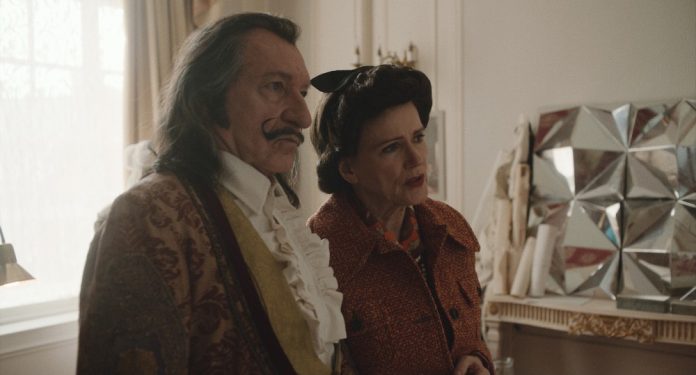For over 30 years, director Mary Harron has been at the forefront of independent filmmaking, having directed classics such as I Shot Andy Warhol, The Notorious Bettie Page, and most famously, the feature adaptation of American Psycho starring Christian Bale. In more recent years, Harron has spent just as much time honing her chops behind the camera in the world of television while continuing to direct a new film every few years.
The director’s latest movie is Dalíland, a biopic starring Sir Ben Kingsley as artist Salvador Dalí during his last years of life when he was living at the St. Regis Hotel in New York City. Set in 1974, the story is told through the eyes of James (Christopher Briney), a young gallery assistant who is brought on to aid the ailing Dalí as he prepares for his next big show with the help of his wife, Gala (Barbara Sukowa), while she has affairs. Ezra Miller, who also stars in The Flash this week, plays the younger Dalí in a couple of flashbacks.
As with Harron’s previous films, Dalíland is a very different take on the traditional biopic, in that it mostly is seen through James’ point of view, though Oscar-winner Kingsley gives another yet enjoyable performance as the eclectic Dalí.
Above the Line hopped on Zoom with Mary Harron to talk about her latest film and what was involved with getting it made, as well as how she found herself hosting a fantastic screening of RRR featuring a Q&A with filmmaker S.S. Rajamouli.
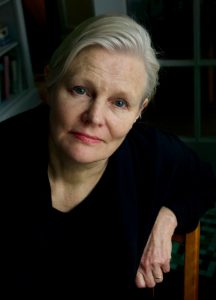
Above the Line: I think the last time we spoke was for Bettie Page, which was quite some time ago.
Mary Harron: A long time ago, and another period film.
ATL: And also somewhat of a biopic.
Harron: Although, even less traditional than this one, I think, because we’ve chosen to cover a very narrow, very specific timeframe.
ATL: Was this project something that originated with you? Did you say that you wanted to do a movie about Salvador Dalí, and then sought out a writer for it?
Harron: No, not at all. [Producer] Ed Pressman, who, rest in peace, passed away a few months ago, had done American Psycho with [me] and Moth Diaries, [and] every so often, he would send me a script. In this case, he had this project, and there had been several scripts about the idea of Salvador Dalí in the ’70s when he was living at the St. Regis Hotel.
Though I loved the idea of Salvador Dalí in the ’70s, I just didn’t want to do another film about an artist. I wasn’t really interested in the story that was being told in those other scripts, and then Ed called again and again, so I said to John, my husband, who wrote the script, ‘They keep writing me about this. Look at this material, and let me know what you think.’ He wrote a memo that really became the basis of the script [and] sort of transformed my feeling about it, which was about focusing on a couple [of] things.
One, this should be a film about a marriage — an extraordinary marriage. Gala, in the other scripts that have been written on the subject, was just a very small part of it. John said she’s fascinating, and she should be a major figure in this, so it’s about the marriage, and it’s about two extraordinary people after sort of 50 years together, facing old age and death, and their [fear] of both. And then, how Dalí, because of this fear, was spinning and spinning and creating these parties and these amazing distractions.
Very early on, there’s this film, [about] which John found an interview [that] Dalí gave, an interview for Spanish TV or a documentary, where he had given this statement, ‘It makes every moment of my life become a tremendous pleasure because death is always there waiting to catch me.’
What he was saying was that life becomes incredibly intense. I think that what we loved about Dalí was the way that he did live so intensely, even in his 70s. He’s living life and [making] art and [indulging in] work and parties extremely intensely, which is exciting. It’s like every day he wakes up, the world is new for him. We liked that about him.
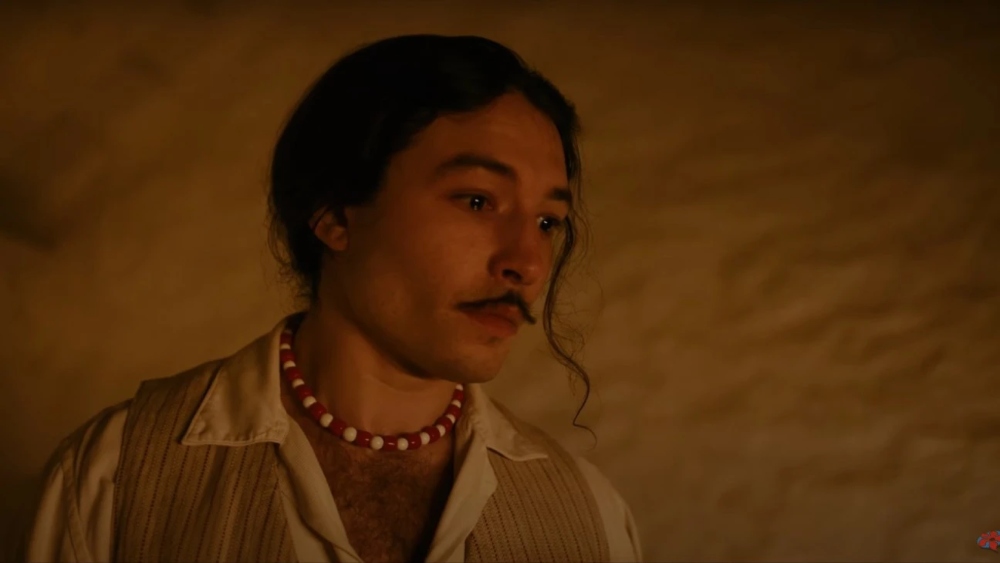
ATL: I know you’re Canadian, but did you spend any time in New York during the ’70s?
Harron: I lived in New York from late ’75 through ’78. I was there for three years, and it was an amazing time for me, a really happy time. It was such an exciting time. I lived in the East Village. That’s when I discovered the CBGB punk scene and was part of that, but you’d also get invited to go uptown to crazy parties. Not Salvador Dalí, although he was around, but I met [Andy] Warhol [and] was at a dinner party with him. You could sort of get invited anywhere in the ’70s. [laughs] It was a very open place, and I wanted to capture that free-for-all, that exciting time in a young person’s life in New York through this character of James.
ATL: I don’t think I knew your husband was a writer or that he wrote this, so is this the first time you’ve directed one of his screenplays?
Harron: Yes, we’re actually writing another project together. We met at the Seattle Film Festival because both of our first films were released by Orion. He had Ed’s Next Move, and I had I Shot Andy Warhol. We didn’t write together for 10 years because he had done romantic comedies and I’d done the stuff I do, but we always showed each other our scripts, and then we started writing TV pilots [together].
We wrote six TV pilots and actually made a living for years writing TV pilots, which you’d get paid very well for, and then do all this work, and then they wouldn’t get made, and then we had another film that we wrote that we lost the rights to for other reasons, so we couldn’t move forward with it. This is the first one that got made, but now we’re on[to] another one.
ATL: How and when did Sir Ben get involved to play Dali? Was he an obvious choice, since he is such a great actor?
Harron: He was attached for… like all independent movies, it kept getting delayed. He stayed really loyal to the project for three or four years before we shot, and at one point, we had to delay for him. At one point, we had to delay for me because I was doing Alias Grace, the Netflix series. Then we had to delay for him because he was doing a TV series, and we were ready to film, and then COVID hit. So then, another year it’s delayed. But he stayed so supportive and loyal to the film.
I think before lockdown, before things shut down, I went [and] spent three days with him in the country at his house in England, and we just talked through the script. He loved the script. He read it on a plane, and he called his agent, I think, after the plane touched down, and said he would do it, which was great because a lot of people might be scared of playing an icon, but obviously, he was not. If you can play Gandhi, you can play anybody.
ATL: Had he ever met Dalí? For some reason, I would have thought Sir Ben would have met him.
Harron: No, he said he had [a Dalí] on his wall, but he had not met him. I’m sorry I didn’t either. We run into lots of people now who have met him, but I never did in my time in the ’70s.
ATL: I was curious about that, too — when he was writing the screenplay — because Alice Cooper is still alive and he appears in this movie.
Harron: We had a Zoom with Alice Cooper. Alice Cooper was at one point going to write a song for us, but Alice Cooper sounds like he’s probably five. He’s completely youthful and excited by life, as far as I can see, and still performing. He said he didn’t understand a word of what he said, Dalí. That line is in the movie, but I think he loved the absurdity of his whole experience with Dalí. One thing he did say about it was that Gala ran the show. There were a lot of people, but Gala ran the show.
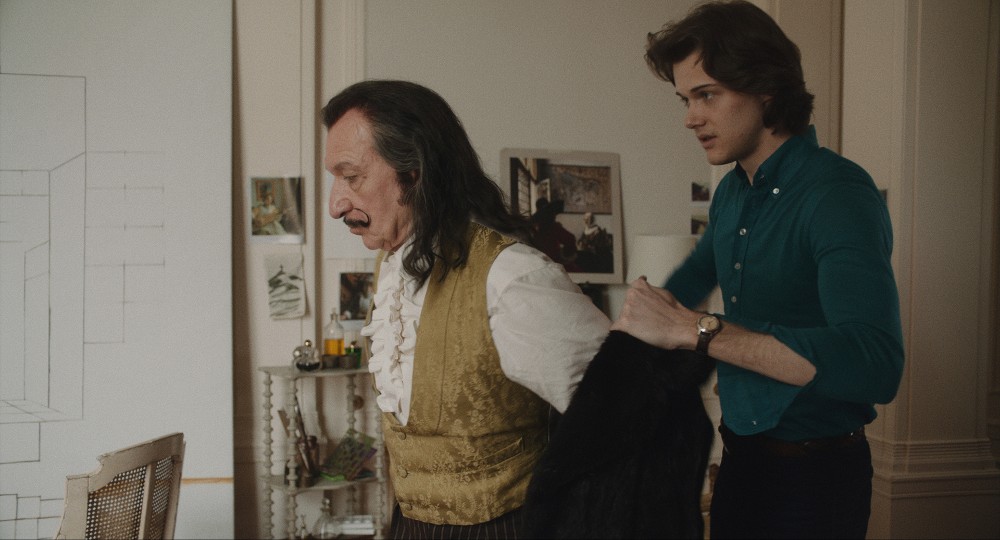
ATL: I was curious about the casting, first of all with Gala, because Barbara is a legendary German actor who I’ve seen in so many things, though it didn’t click when I watched Dalíland that this was the same actress I’d seen in so many things in the ’90s.
Harron: The thing about Barbara is that she’s so famous in Europe and revered because she was Hannah Arendt and she was Rosa Luxemburg, and of course, through [Rainer] Fassbinder and all that. I was amazed when I was checking out how to find Barbara Sukowa that she lives in Brooklyn, as we did for many, many years. When I called her, I was in London. We had to Zoom, and she was in Brooklyn. She was married (now divorced) to the artist Robert Longo, so she had lived in Brooklyn. She has three sons who are now grown. She actually works a lot in Europe, and it’s amazing because she’s such a great actress. It’s been unusual for her to get a big leading role, and I’m so happy that people could see what an incredible actress she is.
ATL: On the other side of the spectrum is Christopher, who plays James. How did you find him? Had he done a lot before you cast him?
Harron: No, he had done nothing. He was straight out of drama school, and we wanted somebody really young and sort of new. This was during lockdown and someone who was going to play James had to drop out. This happened a lot on this film — people had to drop out because of COVID restrictions or work. I decided to try somebody who was just leaving drama school, somebody really new, who was as young as the character.
My casting director said all the showcases from the drama schools are online, because of COVID, so I just watched them all and didn’t find anybody until I got from A through to P — Pace University — and there was Christopher Briney, who was so handsome. I thought, ‘That would be too fortunately, he won’t be any good,’ and then he was great, and he was just the guy. He was perfect for the role. Now he’s in The Summer I Turned Pretty and famous and on his way.
ATL: There’s the illusion of this being shot in New York, but there are obviously so many interiors that you could have shot anywhere. Where did you end up shooting it, and were you able to shoot anything in New York?
Harron: For basically financing reasons, we had European funding mainly, and we shot in Britain, and due to complicated tax reasons, we couldn’t shoot anything in America, and so we shot in Liverpool for New York. It makes more sense than it might seem, because Liverpool and New York as cities, port cities, shipping cities, rose at the same time, basically, and Liverpool, a lot of the architecture is similar to New York architecture of the early 20th century. And they have amazing locations in Liverpool.
We found this old hotel, the Adelphi, we could shut down, because all of Liverpool was in lockdown. We rented the hotel — a thousand pounds a night for everything — and used it for locations and our production offices. And the scenes out on the beach, the coastal scenes, we shot in Anglesey in Wales, because it has these black rocks that look like the ones similar to Dalí’s home. At the very end, while I was editing, John Walsh, [the] screenwriter — my husband — took Christopher Briney and a crew to French Catalonia, Southern France, and shot the very ending of the film and Chris walking around in all these scenes in driving shots and the scenes that looked like Spain; John shot those. We combined Liverpool, Wales, and France.
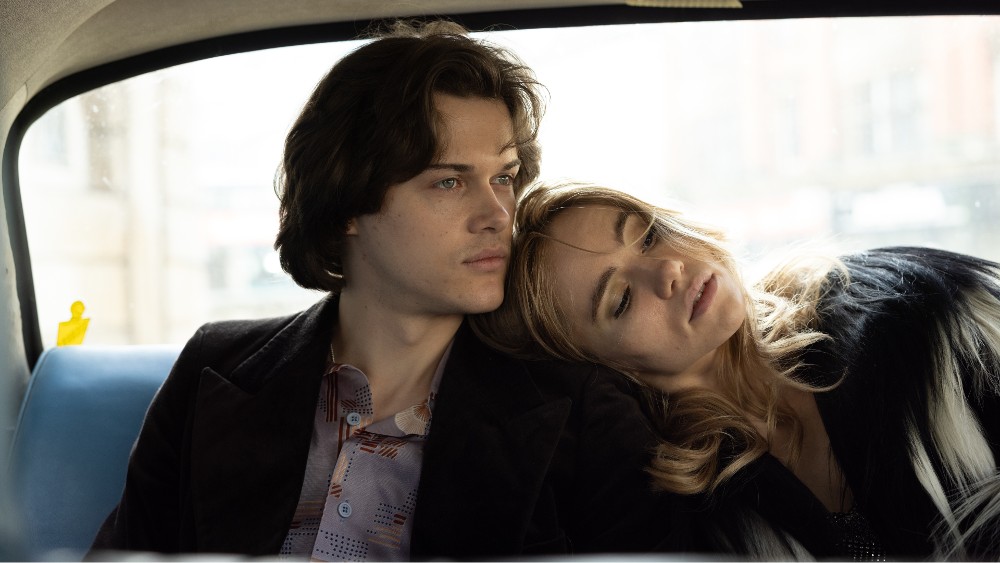
ATL: Did you shoot a lot more of the flashbacks with Ezra that didn’t make the final cut?
Harron: No, no, I wish. Initially, there were five flashbacks, and for budget reasons, partly because of COVID [and] the expenses of shooting in the pandemic and all the testing, we had to cut two of them. There was one, in particular, I was really sorry that we had to cut, which was young Dalí and Gala first arriving in New York, which would have been very expensive to shoot, but I’m really sorry. No, it was really for budget. Originally, there were more flashbacks.
ATL: You didn’t even shoot them, even though they were in the script?
Harron: Never shot them. Just couldn’t afford it.
ATL: I want to ask about the music because it’s 1974 and you have some great tracks from bands like Roxy Music and others.
Harron: It’s funny because somehow you have the songs you think you’re gonna use. Like, we had David Bowie in there [but] we couldn’t afford that, but then we came up with alternatives, and often you come up with alternatives that work just as well. We wanted glam rock and Philadelphia soul, things that were happening. It’s just before disco and just before punk and it’s just a very interesting time in music. It’s the end of glam rock and of a certain era of R&B, and just wanted to have that.
ATL: Was the composer someone you had worked with before?
Harron: No, but Edmund Butt did a great job, and we wanted a real orchestral score, something that gives it emotion and really helps tie the film together, I think. [I] worked very well with him.
ATL: I saw that you’ve been directing more television in the last 10 to 12 years, which didn’t surprise me at all. It’s great to be able to go in and direct an episode and then move on to something else.
Harron: We had children, and that was very helpful, and now, our daughters are 23 and 26, so a bit less tied to home now, [so] we can move around.
ATL: It’s been great talking to you. Earlier this year, you did a Q&A with S.S. Rajamouli for his movie RRR, which I thought was amazing. How did that come together, because it seemed like such a random connection?
Harron: It was totally random. John and I went to a tiny little screening of RRR at the Ludlow House in New York, one of those award screenings, and they asked me afterward, ‘How did you like it?’ and I said, ‘Oh, I loved it. It’s fantastic,’ and they [asked], ‘Would you like to do a Q&A?’ I went from seeing it on this tiny screen in a little theater, and there were like four people there, and then we go to this huge IMAX screening with a billion people. That was also an amazing screening because half the audience seemed to know the whole history and everything in the movie, so that was really fun.
Daliland is now playing in select theaters and available on VOD via Magnolia Pictures.


